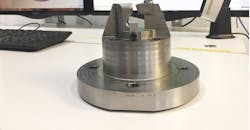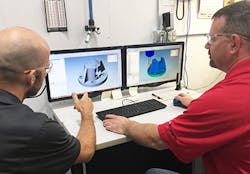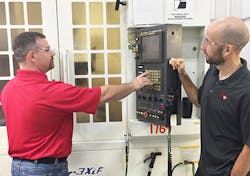Not all cast parts are created equal. In some industries, components made from standard-issue materials just don’t have what it takes to perform over the long-term in demanding applications. Depending on the application, sometimes what’s needed a component that can withstand tougher-than-usual conditions. Those applications are the ones Winsert wants to fill.
Winsert is a Marinette, WI-based manufacturer that develops, casts, and machines various of heat-, wear- and corrosion-resistant alloys into parts that can withstand high-load pressure, corrosive fuel environments and high temperatures. More specifically, the products include valve seat inserts; exhaust gas recirculation (EGR), engine brake, exhaust brake, and turbo system wear components and assemblies; and valves and blades for various applications used in the medium- to heavy-duty engine, food and chemical processing, and forestry industries.
Winsert casts cobalt, nickel, and iron-based heat- and wear-resistant alloys using induction melting and shell sand processes. Pouring capacity is roughly 750 lb., and casting weights range from mere grams to 20lbs.
The foundry also makes extensive use of heat treatment to achieve the desired product profiles, with spectrometry, on-site NDT (liquid die penetrant), and off-site x-ray inspection to ensure the accuracy of its product profiles.
Most castings are fully machined on-site using grinding, turning, milling and mill-turn capabilities, followed by completing product assemblies, as required. Winsert’s material development expertise is centered in a newly constructed, state-of-the-art R&D center, where testing takes place for new and existing alloy materials. Customers rely on the company’s prototyping capabilities — from casting to fully machined parts in three days to one week, from simple to complicated geometries. Putting this all together, Winsert’s evolving product range furthers the customers’ competitive advantages regarding cost and service life.
The R&D center works to solve issues related to material wear by determining the optimal materials, system wear and performance for each application, with an emphasis on providing the highest quality solution at the lowest cost.
Paul Dickinson, left, vice president of special projects at Winsert, and new product technician machinist Jeff Kubash use Esprit to examine a custom fixture, to support five-axis machining for a part that must achieve very high tolerances and withstand high tool forces during machining.
Nearly 40% of the company’s projects begin in the prototype sample cell department, which creates pre-production parts from Winsert’s proprietary Co-, Ni-, and Fe-based alloys. The very thing that makes these materials so special also is what makes them difficult to manufacture: Heat-, wear-, and corrosion-resistance make alloys challenging to machine because they cause extreme machine tool wear. Also, because these materials are developed to address specific customer needs, there are no standard cutting
Kubash and Dickinson run their Esprit G-code through a Kitamura Mycenter-3XiF vertical mill.
recommendations.
But, Winsert cannot compromise on the robustness or uniqueness of its materials. “We can never relax or do what our competition does with industry-standard materials,” said Paul Dickinson, v.p. - Special Projects. “We have to machine cast alloys that easily rival the most challenging cobalt- and nickel-base materials.”
While Winsert’s parts vary in complexity, foundry patterns require very clean toolpaths that will generate the required finishes at a consistent draft, without wasting time cutting air. Confidence in the code and simulation is a must, as many of the programs have long cycle times and often machine only one part.
And, frequently Winsert is asked to commit to short lead times on projects that require foundry tooling.
All told, there are a lot of challenges to surmount, and Winsert needs an exceptionally well-outfitted machine shop to ensure it can progress rapidly alongside its customers to manufacture functional and high-quality designs.
The shop runs more than 70 proprietary CNC two-axis lathes, three Miyano BNE and BNA series six-axis lathes, a Hurco three-axis mill and a Kitamura 3XiF vertical mill. While it was still a lathe shop, Winsert began running the Esprit computer-aided manufacturing (CAM) software in the late 1990s, due to its “impeccable” lathe CAM capability, flexibility and customizability. When the company added milling operations in 2009, Esprit continued to deliver, even though other brands were evaluated.
“Esprit became the clear choice,” Dickinson said. “And yes, we would have changed to a better system if we’d found one, because productivity is that important!”
Esprit helped Winsert to save processes and create better toolpaths; it also provided better options for 3D machining and clean, accurate G-code — the programming language used to inform and control CNC machinery.
“The proof is when I am talking shop with other professionals, listening to their frustrations and limitations with their CAM system,” according to Jeff Kubash, new product technician machinist at Winsert. “They explain how much time is spent generating toolpaths, editing code at the machine, and their complete lack of confidence with the code. It is nice to be on the other side of that coin with Esprit.”
Kubash said that the special features Esprit has developed over time — including templates, tool libraries and saved processes — have helped Winsert to reduce time spent on front-end programming. Cycle times have been reduced by as much as 90 minutes through superior roughing toolpaths and enhanced 3D processes. Esprit also allows the company to control cycle times and eliminate extra tool moves that once left tool marks on workpieces.
The future of Winsert lies in expanding its heavy-duty alloy success into new industries. With new product lines being introduced all the time, Winsert and its prototype sample cell are working to become even more responsive and flexible in order to accommodate exacting customers with highly specific needs.
“We create our future by excelling at what we do every day,” Dickinson said. “The future of Winsert is to continue to diversify our portfolio, both inside and outside the engine. We’ll do that by consistently exceeding customer rapid-response requirements. And that’s why we choose to use Esprit.”
Christin Runkle is public relations and marketing content manager for DP Technology Corp., the developer of Esprit. Contact her at LinkedIn, or visit www.espritcam.com
About the Author
Christin Runkle
Christin Runkle is public relations and marketing content manager for DP Technology Corp., the developer of the ESPRIT CAM program.


